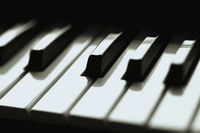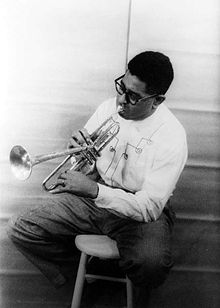Piano Sheets > Dizzy Gillespie Sheet Music > Salt Peanuts (ver. 1) Piano Sheet
Salt Peanuts (ver. 1) by Dizzy Gillespie - Piano Sheets and Free Sheet Music

About the Song
Other avaliable versions of this music sheet: Version 1 Version 2 Version 3
"Salt Peanuts" is a bebop tune composed by Dizzy Gillespie in 1942, credited "with the collaboration of" bebop drummer Kenny Clarke. It is unique in that it has a small sung part in which the singer sings "Salt peanuts, salt peanuts." Most bebop songs have no singing (aside from Scat singing.) Many consider the song a bop jazz standard. Perhaps one of the most famous recordings of this tune is on the Live at the Massey Hall, Toronto, 1953 album, where Dizzy Gillespie and Charlie Parker played with one of their most successful line-ups, which included Max Roach on drums, Bud Powell on piano and Charles Mingus on bass.
The "Salt Peanuts" motif predates Gillespie/Clarke by at least several months, as it appears as a six-note instrumental phrase played on piano by Count Basie on his July 2, 1941 recording of "Basie Boogie" for the Columbia/OKeh label. Basie also played it in a recorded live.
Download this sheet!
About the Artist

Random article
All you need to know about free sheet music The Internet has made it possible for piano enthusiasts to learn how to play piano by using free sheet music available online. There are plenty of websites online, which offer you music notes for playing the piano.
Types of formats
There are various formats available when it comes to online music sheets for the piano. These include GIF, Postscript, finale, graphics interchange, adobe acrobat etc. If you want quick and easy access to sheet music piano then these free websites are the best choice available. Most websites will also have listings based on the genre of music to help you easily select the appropriate category of piano notes.
(More...)
